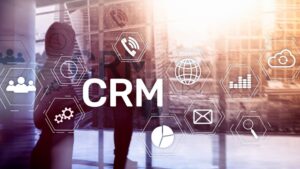Introduction
When it comes to managing business processes and data, two software systems that are often confused are customer relationship management (CRM) and enterprise resource planning (ERP). Although both systems are designed to improve business operations, they serve different purposes. In this article, we’ll explore the key differences between CRM and ERP and help you decide which system is right for your business.

What is CRM?
As we mentioned in the previous article, CRM is a system that helps businesses manage their interactions with customers, including customer data, communication history, and customer feedback. CRM allows businesses to keep track of customer preferences, purchase history, and other valuable information that can help them tailor their products and services to meet the needs of their customers.
CRM systems are typically used by sales and marketing teams to manage customer relationships, improve customer satisfaction, and increase sales.
What is ERP?
ERP, on the other hand, is a system that helps businesses manage their day-to-day operations, including financials, supply chain management, inventory, and human resources. ERP systems are designed to provide a holistic view of a business’s operations, allowing companies to manage their resources more effectively.
ERP systems are typically used by accounting, finance, and operations teams to manage financial transactions, track inventory, and manage supply chain operations.
Key Differences Between CRM and ERP
The key differences between CRM and ERP are:
- Purpose: CRM systems are designed to manage customer relationships, while ERP systems are designed to manage business operations.
- Focus: CRM systems focus on customer interactions, while ERP systems focus on internal operations.
- Data: CRM systems typically manage customer data, while ERP systems manage a broader range of data, including financials, inventory, and human resources.
- Users: CRM systems are primarily used by sales and marketing teams, while ERP systems are used by a range of teams, including accounting, finance, and operations.
- Integration: While both systems can be used independently, they can also be integrated to provide a more complete view of a business’s operations.
Which System is Right for Your Business?
Deciding which system is right for your business will depend on your unique needs and goals. If your primary focus is managing customer relationships, a CRM system may be the best choice for your business. On the other hand, if you need to manage a wide range of business operations, an ERP system may be more appropriate.
It’s worth noting that some businesses may benefit from using both CRM and ERP systems, especially if they need to manage both customer relationships and internal operations.
Frequently Asked Questions about CRM and ERP
- Can I use a CRM system to manage my business operations?
While a CRM system can be used to manage customer relationships, it is not designed to manage internal operations like an ERP system.
- Can I use an ERP system to manage customer relationships?
While an ERP system can be used to manage some aspects of customer relationships, it is not designed to provide the same level of customer relationship management as a CRM system.
- Can CRM and ERP systems be integrated?
Yes, CRM and ERP systems can be integrated to provide a more complete view of a business’s operations.
- Which system is more expensive?
The cost of both CRM and ERP systems can vary widely depending on the features and number of users. Generally, ERP systems tend to be more expensive due to their broader range of capabilities.
Conclusion
Understanding the differences between CRM and ERP systems is essential for businesses looking to manage their operations and customer relationships more effectively. While both systems offer significant benefits, they serve different purposes and are designed for different types of businesses. By considering your unique needs and goals, you can choose the system that is right for your business. If you need to manage customer relationships, a CRM system may be the best choice. On the other hand, if you need to manage a wide range of business operations, an ERP system may be more appropriate. Some businesses may benefit from using both systems in tandem, especially if they need to manage both customer relationships and internal operations. Overall, choosing the right system for your business can help you streamline operations, improve customer satisfaction, and achieve your business goals.
